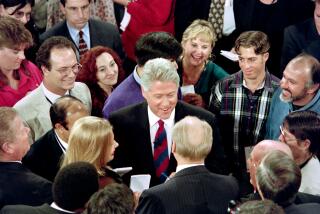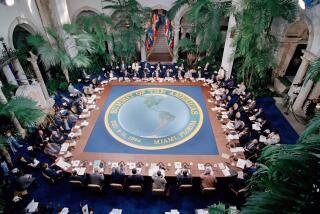A Summit? Or a Seminar? : Whatever it was, it showed Clinton at his best
- Share via
When Theodore Roosevelt hailed the presidency as a “bully pulpit” he was simply noting the many opportunities for influencing public opinion that activist Presidents before and since have intuitively understood and reached for. Bill Clinton, still 35 days away from becoming the nation’s 42nd President and an activist to his core, needs no coaching to appreciate the attention-focusing powers that the office offers.
Attention-focusing was precisely what the economic conference over which he presided this week was all about. Part educational process, part showmanship, it was a well-orchestrated effort to build a consensus in advance of presenting to Congress and the American people early next year economic policies that are certain to be controversial and in many particulars even painful.
LIGHT ON SOLUTIONS: The Little Rock meeting produced little encouraging news. Nor did it offer ready solutions for re-energizing an economy that for too many years now has been listlessly puttering along. Productivity growth is lagging, income inequality increasing, unemployment and underemployment are sapping national morale and, increasingly, the work force is inadequately prepared to do the work that international competitiveness requires. The summit did not even engender much controversy, thanks to a carefully screened guest list of 329 that insured that whatever debate there was would be kept civil and collegial, and that the themes addressed would largely mirror those raised by Clinton in his campaign for the White House.
What, then, did the conference accomplish? For those who were paying attention, it provided a detailed overview of the enormous complexities of the massive U.S. economy, of its strengths and weaknesses, of its past history and of its prospects. It demonstrated that business leaders, economists, public officials and social policy experts, even when they broadly agree about the nature and magnitude of the economic problems confronting the nation, may have sweepingly disparate ideas about how best to respond. And it showed that the President-elect, without the benefit of TelePrompTers or three-by-five cards or hovering aides whispering in his ear, is remarkably well-prepared to talk sensibly and in detail about an impressive spectrum of issues.
HEAVY ON REALITY: This was Clinton at his executive best, reaching out, soliciting advice, refusing to pretend that he knows of any easy answers or sure fixes, warning of tough calls ahead and signaling the urgent need to get health care costs under control. The cost of health care is rapidly emerging as the key deficit-reducing challenge facing the new Administration, and dealing with it will present hardship to many.
If nothing else, the Little Rock conference exposed the nation to a powerful dose of economic reality. With what results? That will likely be made clear over the first three or four months of 1993, when Clinton unveils what could possibly be the most comprehensive new approach to economic stimulus in 60 years.
More to Read
Get the L.A. Times Politics newsletter
Deeply reported insights into legislation, politics and policy from Sacramento, Washington and beyond. In your inbox twice per week.
You may occasionally receive promotional content from the Los Angeles Times.










